
2021-2022 Year in Review
EXECUTIVE SUMMARY

Dr. Dan J. Dupee, II
Administrator-in-Charge
As with the previous two years, the 2021-2022 academic year was impacted by the ongoing
COVID-19 pandemic. While many aspects of the campus environment returned to normal
(i.e. in-person meetings, face-to-face instruction and student activities), the social,
economic, and academic issues introduced or intensified by the pandemic continue to
challenge our campus as we strive to meet evolving student needs. Our faculty, staff,
and administration have once again risen to this challenge.
Faculty, staff and students stayed vigilant in efforts to keep the campus safe and healthy. In March, we lifted the mask requirement, but retained a mask-friendly atmosphere. As a result, Jefferson has maintained a less than 1% COVID positivity rate for the vast majority of the academic year.
In the face of lingering challenges related to the pandemic, Jefferson Community College stayed true to the courses of action outlined in Strategic Plan 2020-2025. In this third year of implementation, our campus moved forward on key initiatives to support student success. The campus enhanced online orientation, improved the student onboarding process with the launch of “Cannoneer Kickoff” and a new advising model, and provided a stronger foundation for new students by requiring participation in a “first year experience” course. Additionally, the College launched an esports team and created a state-of-the art gaming arena, and also finalized plans for a new turf field.
Jefferson also advanced several initiatives to serve the workforce development needs of our North Country region. The College announced plans for an “entrepreneur education” hub in partnership with Neighbors of Watertown as part of New York’s Downtown Revitalization Initiative, introduced ten micro-credential academic pathways and provided targeted in-demand training for the childcare, health and transportation industries.
Jefferson has experienced enrollment declines since 2013. With lower tuition revenues, the College has taken a conservative approach to staffing, reduced costs, and increased focus on data-based decisions. Institutional COVID relief funding has been utilized strategically on initiatives that will strengthen and position the College for long-term sustainability.
This fall, the College will finalize its Strategic Enrollment Management Plan, break ground on the Turf Field project and progress in the development of the entrepreneurship center and collaborative community workspace downtown. In addition, the campus community is preparing for its April 2024 accreditation visit by the Middle States Commission on Higher Education. The Middle States Steering Committee was identified during the Spring 2022 semester and workgroups for each of the seven standards have begun the research that will inform the Self Study report. We have engaged an expert in DEI&SJ to assist with implementing SUNY’s revised curriculum framework and to evaluate and recommend professional development for the College’s faculty and staff. Guided Pathways outcomes will be operationalized and assessed. Partnerships with local employers and the Jefferson-Lewis Board of Cooperative Educational Services will create opportunities for new academic and career training pathways. Finally, the College will continue with implementation of the 2021-2026 Facilities Master Plan, which was approved by the Board of Trustees in March 2022.
The College is currently undergoing transitions in leadership. Dr. Ty Stone, who became Jefferson’s sixth president in May 2017, resigned from the College early in June 2022. Dr. Dan Dupee, the College’s executive vice president overseeing finance, administration and enrollment services, was appointed Administrator-in-Charge by the Board of Trustees upon Dr. Stone’s departure. The College is conducting a search for its seventh president over the course of the 2022-2023 academic year.
The vision for Jefferson Community College affirms that the College will be a premier higher education institution, transforming lives to strengthen the region and foster positive change worldwide. The realization of this vision is demonstrated by a recent Economic Impact Study, which found the College had a positive economic impact of $68.4 million on the tri-county region. Certainly, the College is helping to transform the economy and lives in the North Country and creating a positive return on investment.
It is our promise to continue to deliver on the College’s mission to educate, inspire and empower. We will continue our focus on equity, innovation, and entrepreneurial, future-leaning initiatives to serve our students and our community well. We will provide quality education and training to support our students on their academic journeys and professional pursuits and do all we can to support business and industry locally, regionally and statewide, by providing a skilled and relevant workforce.
STRATEGIC PRIORITIES 2021-2022
The Board of Trustees endorsed the 2020-2025 Strategic Plan (Res. 175-19) on September 6, 2019. The foundation of the Strategic Plan is grounded in these four key strategies:
Pathways
Create educational and career pathways that meet the needs of students and the community.
Partnerships
Strengthen partnerships with K-12 schools, universities, and employers to enhance
program excellence, drive economic development, and ensure regional prosperity.
Student Experience
Design and implement an inclusive student experience that advances equitable outcomes,
purposefully integrates diversity, and prepares students to be successful global citizens.
Sustainability
Secure financial sustainability through organizational efficiencies, best practices,
and innovative initiatives.
As an institution of higher learning, our primary business is about educating our students. The four key strategies were grounded in that core focus, as student instruction is what we do and our sole purpose for existence. As such, the College’s Mission was updated to reflect the College’s focus on instruction.
Jefferson Community College Mission Statement:
Educate. Inspire. Empower.
2021-2022 Year in Review by Key Strategy
- Participated in the second cohort of SUNY’s Community of Practice for Guided Pathways, completing the Capstone Institute 5 in April.
- Identified eight areas of interest (AOIs) within the four academic schools and developed advising guides for faculty and videos to share with incoming students as part of the onboarding process.
- Improved student success and persistence by developing a first-year experience course for new students who enroll at Jefferson with fewer than 24 college credits in hand. Following a successful Fall 2021 pilot of the program, the new student seminar course (entitled INT 111 College Foundations) became a requirement of graduation as approved by the Board of Trustees in March 2022. The Fall 2022 semester has 20 sections and 266 student enrollments in INT 111.
- Implemented a new advising model that embeds educational planners in each of the four academic schools to advise new students during their first semester and again during winter and summer when faculty advisors are not on campus. Additionally, Advising Fellows were appointed to serve in a mentoring capacity.
- Utilized the High-Enrollment Low-Pass (HELP) Rate report to identify potential barrier courses for students and implemented steps to address these barriers.
- Engaged employers, alumni, students, transfer institutions and community members in a review of each of our academic programs to ensure we are providing relevant skills and education for workforce and transfer. Annual Program Assessment Data Point reports were updated and shared with Program Advisory Boards.
- Collaborated with Jefferson-Lewis Board of Cooperative Educational Services (BOCES) to implement a pipeline that provides a direct link to a college degree within one year through the coordinated use of concurrent enrollment credits, prior learning assessments (PLA), and intersession coursework. This fall, 17 BOCES graduates enrolled in the Business Studies A.O.S. degree program at Jefferson.
- Created ten new microcredentials in the fields of hospitality, culinary arts, communication, business leadership, healthcare management, software development and direct support professional. The microcredentials were developed and marketed to drive fall enrollment and utilized SUNY REACH funding.
- Expanded enrollment capacity in the Nursing A.A.S. program through a partnership with SUNY Polytechnic Institute.
- Trained five Dental Assistants this summer in response to an urgent workforce training request from a local family healthcare center.
- Prepared 110 students for certification in allied health careers including phlebotomy, pharmacy technician, and clinical medical assistant. Courses were offered both online and in-person in Watertown and Lowville.
- Selected to join Intel’s AI for Workforce program, which aims to equip community college students across the country with the necessary artificial intelligence (AI) skills for employability in the digital economy. The program is a collaboration between Intel, Dell Technologies and the American Association of Community Colleges (AACC). Through the partnership, JCC will integrate Intel’s artificial intelligence curriculum into its Computer Information Systems and Computer Science programs.
 Initial results from the pilot program indicate that 90% of students who completed
the new student seminar course (INT 111 College Foundations) persisted from fall to
spring semester!
Initial results from the pilot program indicate that 90% of students who completed
the new student seminar course (INT 111 College Foundations) persisted from fall to
spring semester!
 The average associate degree graduate from Jefferson will see an increase in earnings
of $7,200 each year compared to someone with a high school diploma working in New
York. Source: Economic Impact Report
The average associate degree graduate from Jefferson will see an increase in earnings
of $7,200 each year compared to someone with a high school diploma working in New
York. Source: Economic Impact Report
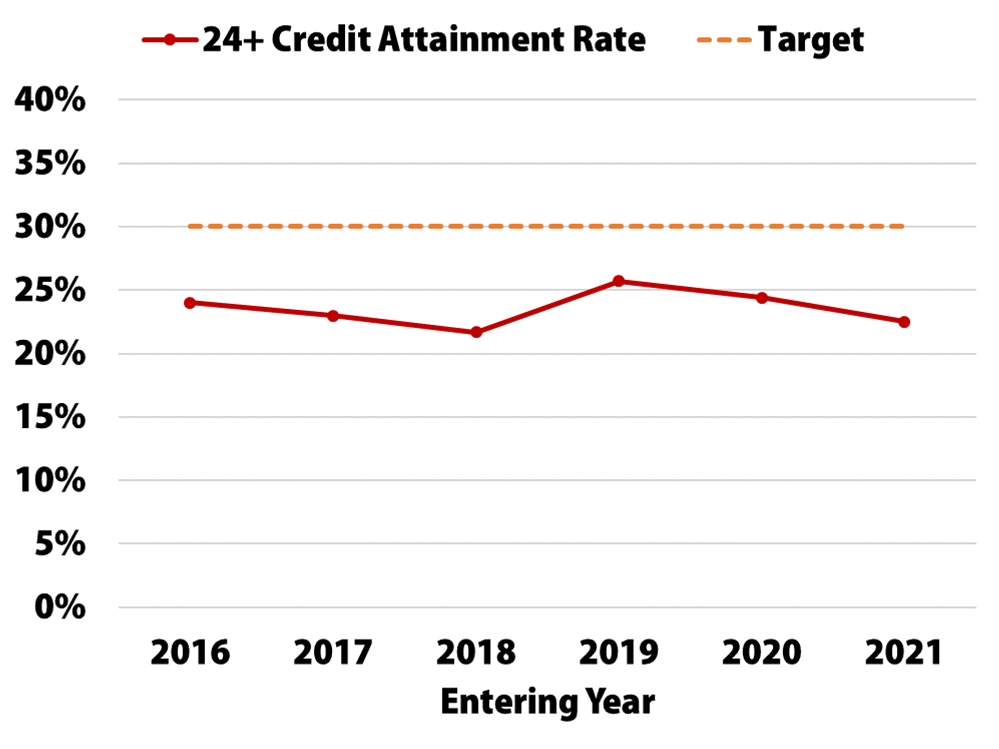
PATHWAYS KEY PERFORMANCE INDICATOR
Goal: Increase the 24+ Credit Attainment rate.
Why? Students who complete at least 24 hours within their first academic year are more likely to graduate on time.
Target: 30% by 2025
- Presented results of two surveys administered as part of the Education to Employment initiative to employers and educators at a community breakfast. Survey findings identified gaps between student demands, community needs, and the region’s employment needs and served as the impetus behind many of the partnerships and 2021-2022 outcomes noted in this report.
- Collaborated with the Community Action Planning Council and JCC’s Small Business Development Center to offer non-credit and credit-bearing educational and entrepreneurial training for individuals to start new home-based childcare businesses and help mitigate the childcare desert crisis in our region. This program was offered in both Lewis and Jefferson counties. In total, the first cohort resulted in 8 new businesses and 56 new childcare slots in our community. A second home-based childcare training program with 11 participants is concluding in January 2023. It is worth noting that this training model has been replicated at other SUNY schools and in other states.
- Delivered CDL-A training to 15 individuals, helping on a local level to address the nationwide truck driver shortage. Programs were offered in both Lewis and Jefferson counties in partnership with the National Tractor Trailer School. All students have passed the CDL-A exam, twelve are already employed as drivers and one is continuing his education in heavy equipment. Seven of the students were displaced New York Air Brake employees upskilling for a new career.
- Delivered CDL-B training to eight employees of The Arc Jefferson-St. Lawrence County meeting a critical workforce need for public transit drivers in St. Lawrence County.
- Continued the successful Heavy Truck apprenticeship program in partnership with Renzi Food Services. The College has successfully trained three cohorts of Heavy Truck apprentices by leveraging SUNY funding for related instruction, and is looking for opportunities to expand offerings in support of local employers.
- Signed an MOU with the Department of the Army that designates the College as a provider of credential/certification training on the ArmyIgnited portal and permits Soldiers to access Credential Assistance (CA) funding for such training.
- Collaborating with Neighbors of Watertown to renovate a historic building in downtown Watertown to create a hub for entrepreneurship education and support the small businesses critical to economic development. The facility will house the Small Business Development Center and provide shared collaborative workspace and resources for community members. This project is funded by New York State’s Downtown Revitalization Initiative and is supported by Empire State Development.
 The New York State Department of Education awarded Jefferson’s Liberty Partnership
Program (LPP) grant with the Watertown City School District funding for another 5
years, $250,000 per year.
The New York State Department of Education awarded Jefferson’s Liberty Partnership
Program (LPP) grant with the Watertown City School District funding for another 5
years, $250,000 per year.
 Due to the College’s innovative home-based childcare training program, Jefferson and
Lewis were the only counties in the North Country region to increase available childcare
child options during the pandemic. Read more at North Country Public Radio.
Due to the College’s innovative home-based childcare training program, Jefferson and
Lewis were the only counties in the North Country region to increase available childcare
child options during the pandemic. Read more at North Country Public Radio.
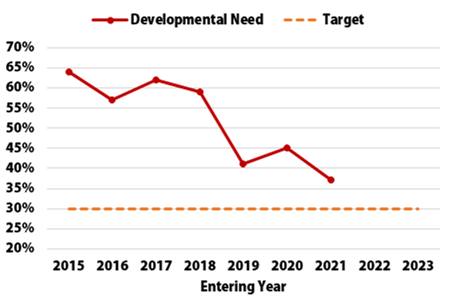
PARTNERSHIPS KEY PERFORMANCE INDICATOR
Goal: Reduce the number of students who require one or more developmental courses.
Why? The requirement to complete development coursework can delay graduation.
Target: 30% by 2023
- Strengthened retention by applying the “It Takes a Village” approach to student engagement. In this model, every student is placed in a cohort (such as athlete, residence hall student, opportunity program participant, etc.) and connected with a faculty or staff member during their first semester.
- Strengthened advising by implementing the “It Takes a Village” model which enhances the advising and engagement experience for students by providing them direct contact with multiple college staff that directly relate to cohorts aligned according to their specific interest such as athletics, residence hall residents, etc.
- Created a student retention dashboard to dynamically display persistence patterns presented in aggregated and disaggregated formats.
- Engaged in thoughtful discussions about social injustice and race via public community forums hosted online by the College’s Voices for Social Change organization. Related, the College’s Board of Trustees adopted Resolution #155-20 Statement on Social Justice in October 2020.
- Introduced the College’s first-ever mascot -- an eagle in a Cannoneer costume who was named Boomer with the help of a community survey that gleaned nearly 1000 responses. The mascot was the last piece of comprehensive rebrand of the athletics program that will also improve student retention through higher student engagement and connection to campus.
- Prioritized the importance of celebrating student success by hosting the College’s first ever “Diplomapalooza” event with over 140 students participating in the drive-through commencement ceremony.
- Implemented a “cook off” program that utilized innovative technology and allowed students from JCC and the Universidade Portucalense (Portugal) to receive instruction and cook alongside one another, as well as deepen their appreciation for each other's culture.
- Approved a smoking/vaping policy and a name preference policy both demonstrating the College’s ability to remain current and relevant in responding to the changing expectations of our students.
- Addressed food insecurity among students with the expansion of the College Food Pantry to a 501(c)(3) organization officially affiliated with the Food Bank of Central New York. In addition, the food pantry now provides internship opportunities for human services and social work majors from Jefferson and partner colleges.
- Revised the Student Code of Conduct to streamline processes to provide clarity for all parties, and ensure equity and transparency for all students. Cases were adjudicated within the allotted timeframe and less than 10% of violators were repeat offenders.
- Administered the Community College of Survey of Student Engagement to assess perceptions of campus climate among students. Results will be shared and used to improve the educational experience in early 2022.
 Distributed $4.3 million in COVID relief stimulus funding directly to students.
Distributed $4.3 million in COVID relief stimulus funding directly to students.
 Distributed 37 Thanksgiving Baskets to students. This initiative was supported by
staff donations and spearheaded by the Campus Food Pantry.
Distributed 37 Thanksgiving Baskets to students. This initiative was supported by
staff donations and spearheaded by the Campus Food Pantry.
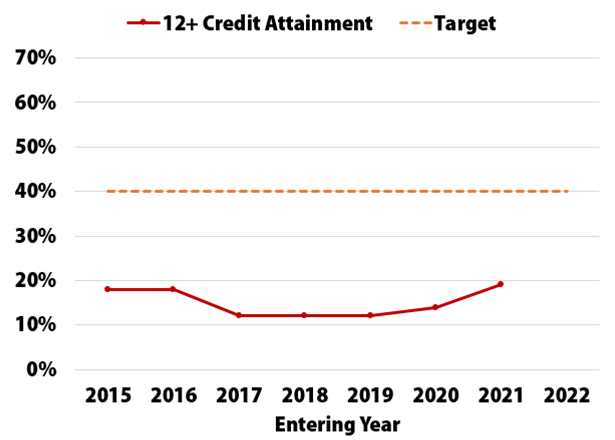
STUDENT EXPERIENCE KEY PERFORMANCE INDICATOR
Goal: Increase the percentage of Black, Hispanic, and Native American students earning 12 or more credit hours in their first term.
Why? Students who complete 12 or more credit hours in their first term are more likely to persist.
Target: 40% by 2022
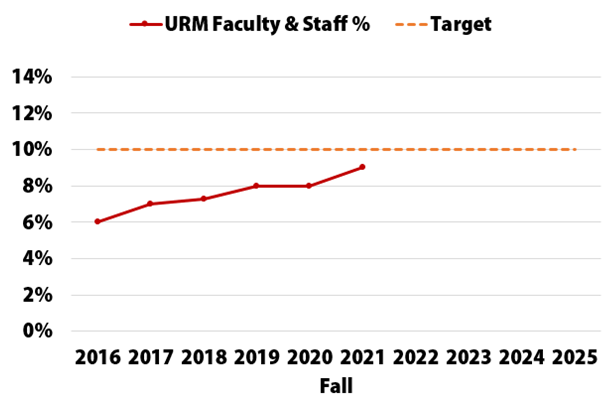
Goal: Increase the percentage of faculty and staff who belong to a racial or ethnic minority group.
Why? A diverse faculty and staff supports an inclusive campus climate.
Target: 10% by 2025
- Updated the College’s Facilities Master Plan for 2021-2026.
- Embarked on development of a new Strategic Enrollment Management Plan with the assistance of the Lumina Foundation, American Association of Collegiate Registrars and Admissions Officers (AACRAO) and The plan will be finalized and implementation begun this fall.
- Initiated an analysis of military enrollment to see how we can better serve this population. Findings will be shared with College leadership during the Fall 2022 semester and an action plan developed.
- In response to the PACE Climate Survey administration:
- increased communication and transparency by sharing organizational charts on the College’s portal, launching an enhanced online faculty/staff directory that provides additional information regarding individual roles on campus, committing to consistent and frequent updates by College administration via email, town halls and campus conversations; and
- initiated a thorough review of campus committees with a goal of consolidation/reduction to manage time and campus resources more effectively and efficiently; and
- identified campus culture, spirit and collegiality as a focal point for improvement with initiatives to be led by the President’s Administrative Cabinet. Specific efforts to improve campus culture began in July 2022.
- Created opportunities to increase enrollment by adding esports and finalizing plans for a turf field, both of which will attract new student athletes. In addition, the turf field allows Jefferson to bring back lacrosse as an intercollegiate sport, an important recruiting tool. The turf field project is made possible with funding from these partners: JCC Foundation, Faulty Student Association of JCC and New York State with support from the College’s sponsor, Jefferson County.
- Created a new Cannoneer giving experience in partnership with the JCC Foundation and athletics department that allows athletic program donors to give directly through the Foundation.
- Increased annual fund giving by 5% over last year and attracted 6% more donors by demonstrating our value in the region.
 Distributed 203 scholarships valued at $240,852 to Jefferson students.
Distributed 203 scholarships valued at $240,852 to Jefferson students.
 The renowned Center for Community Studies at Jefferson released findings of the first
ever North Country Current Issues survey. Nearly 1500 adult residents from the tri-county region were surveyed about diversity,
equity, and inclusion; community services; community issues; local government roles
in our communities; current economic situation and inflation; and employment.
The renowned Center for Community Studies at Jefferson released findings of the first
ever North Country Current Issues survey. Nearly 1500 adult residents from the tri-county region were surveyed about diversity,
equity, and inclusion; community services; community issues; local government roles
in our communities; current economic situation and inflation; and employment.
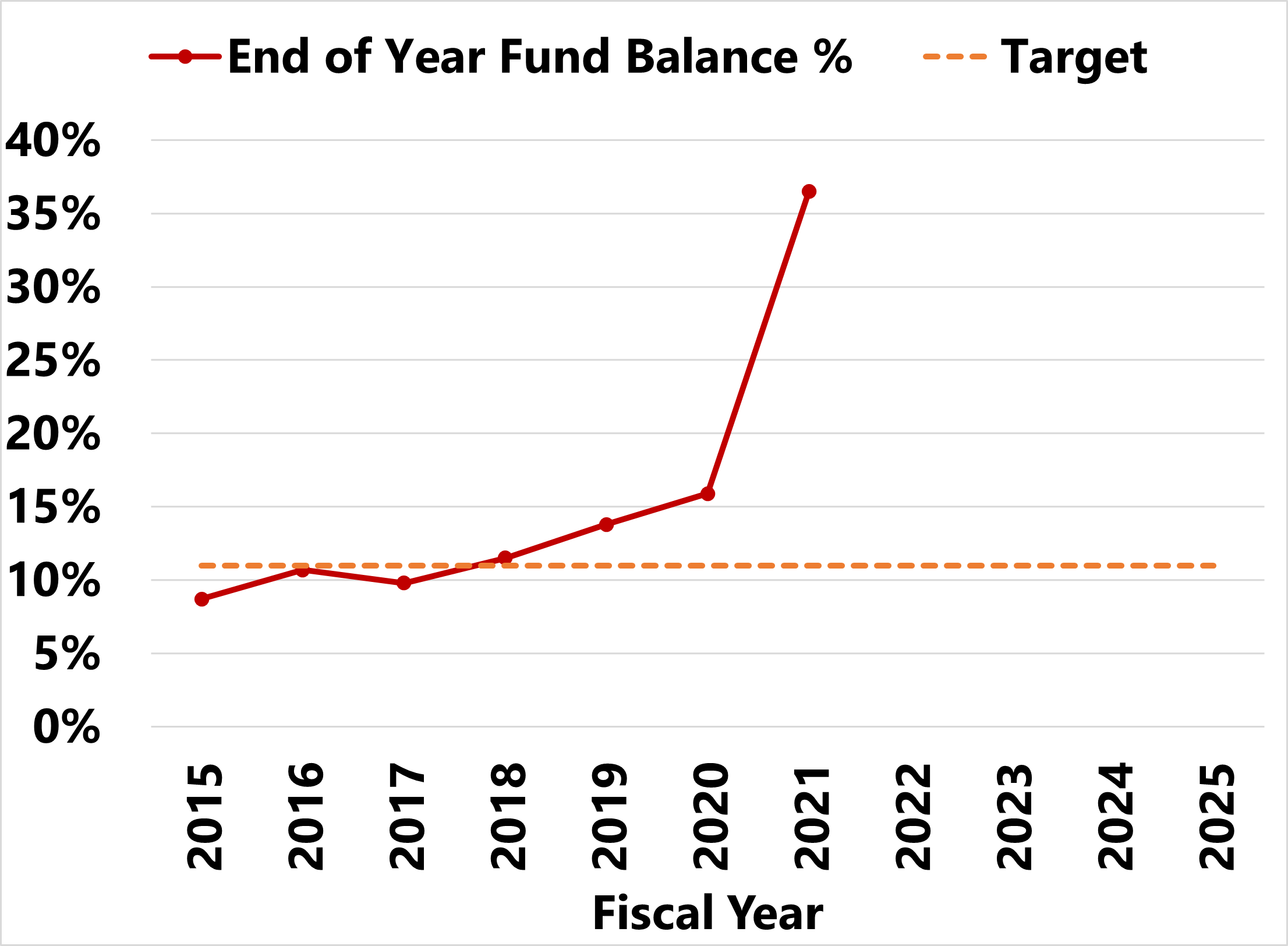
SUSTAINABILITY KEY PERFORMANCE INDICATOR
Goal: Increase the percentage of fund balance in relation to the operating budget.
Why? Fund balance is indicative of the financial health of the institution.
Target: 11% by 2025
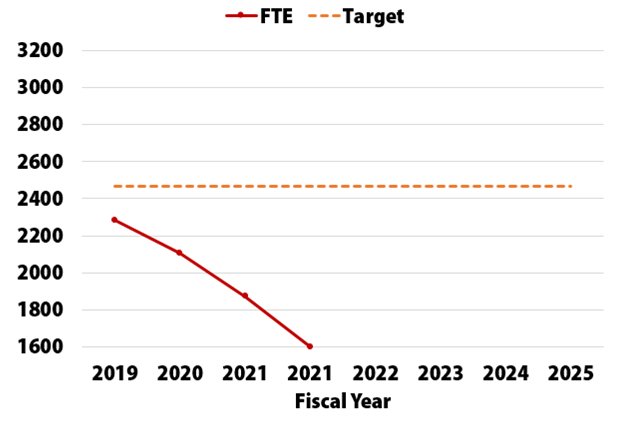
Goal: Increase the number of full-time equivalent
(FTE) students enrolled at the College.
Why: A stabilized enrollment enables the College to support innovation.
Target: 2,466 FTE by 2025
Awards & Recognition
- Earned 2022-2023 Military Friendly® School designation by Viqtory, publisher of G.I. Jobs®, Military Spouse and Military Friendly® publications; over 1,800 schools participated in the 2022-2023 survey with 665 schools earning award level designations in gold, silver, and bronze. JCC is one of 282 schools selected for the “gold” award status for its leading practices, outcomes and effective programs.
- Jefferson’s Liberty Partnership Program with the Watertown City School District was commended by NYSED for being one of just 22 of 46 Liberty Partnership programs to be serving 95% of potential enrolled students.
- JCC’s Nursing Program ranked #2 in New York State (out of 68) by Nursing Schools Almanac. This accolade is due in part to our students’ high marks: 95.7% pass rate (ten-year average) for JCC students taking the NCLEX for the first time.
- Recognized by Military Times in the 2021 Best for Vets: Colleges. JCC is one of only three New York community colleges to make the list.
- Jefferson is one of 346 colleges nationwide named as a Military Friendly Spouse School by militaryfriendly.com.
- The College’s Food Pantry recently received a “Hunger Hero” certificate of recognition from the Food Bank of Central New York.
- One of Jefferson’s adult learner videos, produced by Advance Media, won a dotCOMM Award Honorable Mention. The dotCOMM awards are administered by the Association of Marketing and Communications Professionals (AMCP).
 JCC nursing student Aynalem Mwaipyana, who is currently serving at Fort Drum, was
featured in the SUNY Veteran and Military Services Quarterly Newsletter in April.
We are proud of our service members and privileged to play a role in their education.
JCC nursing student Aynalem Mwaipyana, who is currently serving at Fort Drum, was
featured in the SUNY Veteran and Military Services Quarterly Newsletter in April.
We are proud of our service members and privileged to play a role in their education.
 Jefferson alumni “Paul” was a featured educational success story in New York’s Criminal
Justice Investment Initiative report. Paul took classes from Jefferson while incarcerated,
graduated from JCC in 2019, went on to earn his bachelor’s from John Jay College,
is now employed in a living wage job and recently bought a house and a car. The courses
we offer and work we do at Cape Vincent and Ogdensburg correctional facilities matters.
Jefferson alumni “Paul” was a featured educational success story in New York’s Criminal
Justice Investment Initiative report. Paul took classes from Jefferson while incarcerated,
graduated from JCC in 2019, went on to earn his bachelor’s from John Jay College,
is now employed in a living wage job and recently bought a house and a car. The courses
we offer and work we do at Cape Vincent and Ogdensburg correctional facilities matters.

- Cannoneer Kickoff for new students

- Completion Day cab rides for students

- Student practicing at the new eSports arena

- Rebranded Jefferson Gymnasium

- Turf field groundbreaking ceremony with JCC mascot Boomer

- Turf field groundbreaking ceremony

- Media briefing of new DRI project

- SSG Travis Mills presenting at JCC
Board of Trustees
Board of Legislators
For More Information
Karen Freeman
Special Assistant to the President
[email protected]
(315) 786-2404
